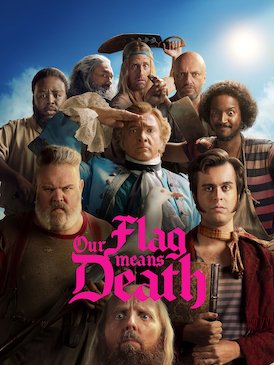Cassie Pataky
Featured Co-Editor
On May 20, the Carsey Wolf Center screened two episodes of “Our Flag Means Death” (OFMD), a popular Max series about a love story between Stede Bonnet and Blackbeard. After the screening, executive story editor Eliza Jiménez Cossio joined Professor Chip Bradley from the English department at UC Davis to discuss her process in helping to write the series.
OFMD follows wealthy landowner Stede Bonnet as he decides to become a pirate — with questionable success. Bonnet eventually meets (or rather, gets captured by) Blackbeard, the legendary pirate, and the two men learn a lot from each other as their relationship develops. The story is loosely based on true events since Stede Bonnet and Blackbeard are both real historical figures that did meet and sail together for a time.
When asked about how strictly they had to follow the true history, Cossio reported, “It was there at the surface, but we never felt like we had to stick to anything.”
It was also mentioned that pirate ships were historically a hodgepodge of people from all backgrounds. Cossio commented that having a diverse writing room made it easier to incorporate both racial and sexual identity into the development of the many characters.
One aspect that OFMD is known for is its LGBTQIA+ representation. Cossio speculated the reason the show is so compelling to the audience is that it allowed queer characters to “simply exist.”
Rather than an identity-based show that references the challenges of being queer, the show simply incorporates the queer elements as if they were ordinary aspects of pirate life.
“I like leaving space to allow the characters to focus on love rather than identity,” Cossio said.
Cossio broke down the writing process further for the audience, explaining that writing is a collaborative process.
“It is inaccurate to say that I alone wrote Episode 4. We all outlined together. Ideas come from so many different places. I just happen to be the name on it that is meshing it all together,” she shared.
Two themes that the writers had to navigate meshing together within OFMD were the danger and explicitness of piracy and the fondness of comedy. Cossio explained that, though this may seem like a complicated mix, real life is often a mishmash of emotions just as, if not more, complex. In keeping her characters based on reality, Cossio was able to navigate the crossover between the two genres. Cossio also pointed out that the crossover created the comedic aspects of the series.
She said, “Comedy characters shouldn’t know they are in a comedy.”
Bonnet takes his pirating career very seriously, portraying himself comedically as out-of-place. With this seriousness, however, the writers can still incorporate the serious motifs of trauma and violence typical of a pirate film.
One of the most important aspects of comedy films and series is the jokes. Cossio explained that when writing the script, she would create “alts” — alternative jokes that essentially didn’t make it into the final script but should be recorded if a change needs to be made during production.
When asked about allowing for improvisation, Cossio admitted that she and the writers don’t really think about this. Instead, it is the director’s job to figure out where in the script there is room for improvisation and which actors can do it. That said, Cossio said having a writer on set facilitates this process more easily.
Currently, writers are not able to involve themselves in production, which is one ability that the Writers Guild of America is advocating for in their strike. In addition to this ability, the Writers Guild of America is arguing for raises, employment guarantees, and protection against artificial intelligence.
Though the screenwriting realm is a bit chaotic currently, Cossio imparted to all writers, including herself, “Writing is regenerative and creativity is always in you.”











